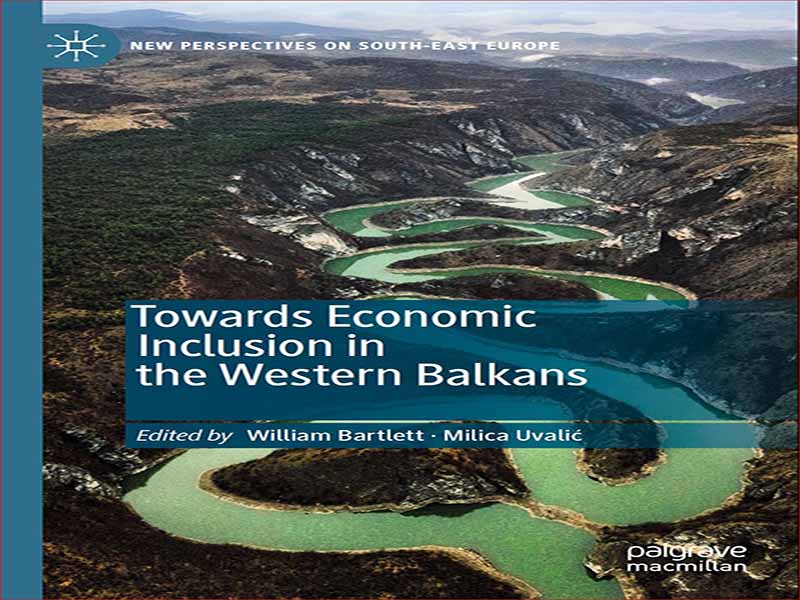- عنوان کتاب: Towards Economic Inclusion in the Western Balkans
- نویسنده: William Bartlett
- حوزه: تحول اقتصادی
- سال انتشار: 2022
- تعداد صفحه: 393
- زبان اصلی: انگلیسی
- نوع فایل: pdf
- حجم فایل: 9.60 مگابایت
این کتاب محصول فعالیت شبکه تحقیقاتی LSEE در زمینه انسجام اجتماعی است که در سال 2011 با هدف ترویج تحقیقات مستقل در مورد مسائل توسعه اجتماعی-اقتصادی در منطقه SEE راه اندازی شد. تمرکز عمده کار این شبکه تحقیقاتی بر روی مشکلات اقتصادی و اجتماعی «بالکان غربی» بوده است، گروهی از کشورهای اروپایی که طی چندین دهه به دنبال پیوستن به اتحادیه اروپا با موفقیت اندک به جز کرواسی بودهاند. کشورهای بالکان غربی – آلبانی، بوسنی و هرزگوین، کوزوو، مونته نگرو، مقدونیه شمالی و صربستان – در مراحل مختلف ادغام با اتحادیه اروپا هستند. همه مشکلات اقتصادی و اجتماعی از سطح بالای بیکاری، فعالیت های اقتصادی غیررسمی زیاد، سیستم های ضعیف حمایت اجتماعی و سطوح بالای فقر و نابرابری را به مراتب بیشتر از سایر نقاط اروپا تجربه می کنند. این منطقه همچنین تحت تأثیر شدید همهگیری کووید-19 با «مرگهای بیش از حد» ناشی از این همهگیری در میان بالاترینترین کشورهای جهان قرار گرفته است. 1 پنج کشور از این کشورها بخشهای جزئی از یوگسلاوی سابق بودند و به همین دلیل دارای تعداد زیادی هستند. مشترک. محور اصلی سیاست اقتصادی در سالهای اخیر ارتقای همکاریهای منطقهای بوده است و چندین طرح بینالمللی از جمله کار شورای همکاری منطقهای، مستقر در سارایوو، و توافقنامه تجاری منطقهای CEFTA که شامل مولداوی نیز میشود، به این هدف اختصاص یافته است. ارتقای همکاری منطقهای در فعالیتهای تحقیقاتی و بررسی مزایای همکاری منطقهای در پیشنهادات سیاست انگیزه اصلی شبکه تحقیقاتی LSEE است. شبکه تحقیقاتی موضوعات سیاستی مانند اشتغال و ایجاد شغل، عدم تطابق مهارت ها، آموزش و آموزش حرفه ای، اصلاحات بهداشتی، اصلاحات بازنشستگی، فقر و حمایت اجتماعی، کارآفرینی اجتماعی، اقلیت های قومی و گنجاندن روماها، تمرکززدایی و توسعه منطقه ای را پوشش می دهد. تمرکز بر ارائه شواهد تحقیقاتی اصیل و مرتبط برای حمایت از پاسخ های سیاستی موثر به وضعیت اجتماعی دشوار در منطقه. این شبکه چهار کنفرانس بین سالهای 2011 و 2017 و چندین کارگاه متمرکز برگزار کرده است که منجر به تولید تعدادی کتاب، مقاله و گزارش شده است. انسجام در جنوب شرق اروپا، در دانشگاه بلگراد در نوامبر 2019 با حمایت بانک اروپایی بازسازی و توسعه (EBRD) برگزار شد. این کنفرانس موضوع شمول اقتصادی را تحت پوشش قرار داد و به راههایی پرداخت که توسعه اقتصادی را میتوان برای کمک به ایجاد مشاغل با کیفیت، بهبود آموزش حرفهای، حمایت از کارآفرینی زنان و ادغام مهاجران طراحی کرد.
This book is a product of the activity of the LSEE Research Network on Social Cohesion set up in 2011 with the aim to promote independent research into issues of socio-economic development in the SEE region. A large focus of the work of the research network has been on the economic and social problems of the “Western Balkans”, a group of European countries that have been seeking to join the EU over several decades with as yet little success except Croatia which became an EU member state in 2013. The Western Balkans countries—Albania, Bosnia and Herzegovina, Kosovo, Montenegro, North Macedonia and Serbia—are in various stages of EU integration. All experience economic and social problems ranging from high level of unemployment, much informal economic activity, weak social protection systems and high levels of poverty and inequality, to a far greater extent than most other parts of Europe. The region has also been hit by the heavy impact of the COVID-19 pandemic with ‘excess deaths’ from the pandemic amongst the highest in the world.1 Five of these countries were component parts of the former Yugoslavia and as such have much in common. A major thrust of economic policy in recent years has been to promote regional cooperation and several international initiatives have been devoted to this purpose including the work of the Regional Cooperation Council, based in Sarajevo, and the CEFTA regional trade agreement which also includes Moldova. The promotion of regional cooperation in research activity and the investigation of the benefits of regional cooperation in policy proposals is a key motivation of the LSEE Research Network.
The Research Network covers policy themes such as employment and job creation, skill mismatches, education and vocational training, health reforms, pension reforms, poverty and social protection, social entrepreneurship, ethnic minorities and Roma inclusion, decentralisation and regional development, all with a focus on providing original and relevant research evidence to support effective policy responses to the difficult social situation in the region. The network has held four conferences between 2011 and 2017 and several focused workshops, leading to the production of a number of books, papers and reports.2 This book results from a selection of papers presented at the 5th Conference of the LSEE Research Network on Social Cohesion in South East Europe, held at the University of Belgrade in November 2019 with the support of the European Bank for Reconstruction and Development (EBRD). The conference covered the theme of economic inclusion, addressing the ways in which economic development can be designed to contribute to the creation of quality jobs, improved vocational training, support for female entrepreneurship and the integration of migrants.
این کتاب را میتوانید از لینک زیر بصورت رایگان دانلود کنید:




































نظرات کاربران